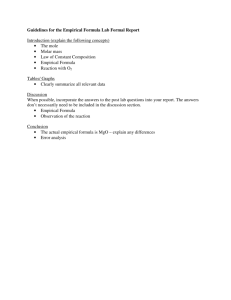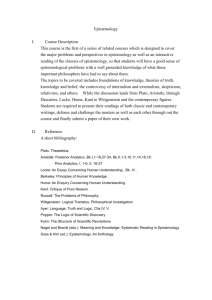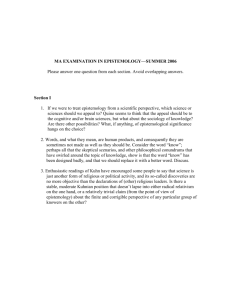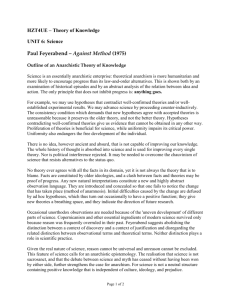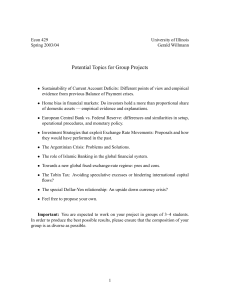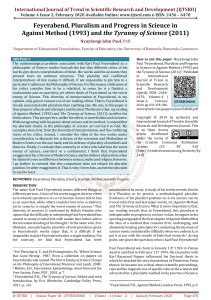Scientific Research and the Fact as Social and Hermeneutic Structure
advertisement
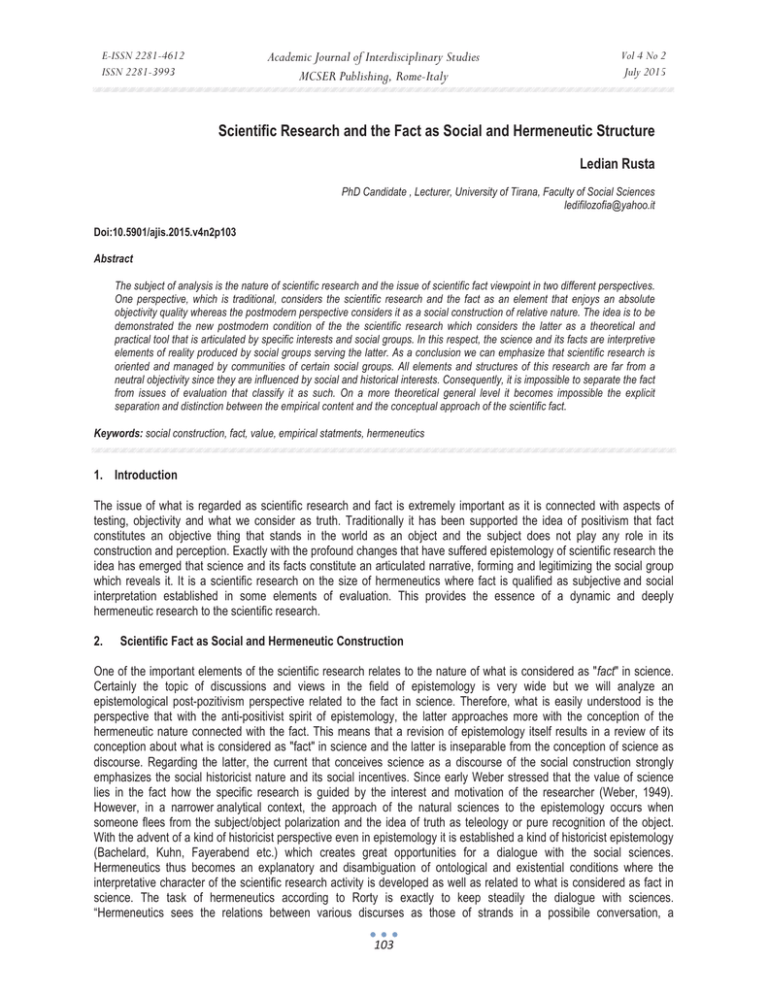
Academic Journal of Interdisciplinary Studies MCSER Publishing, Rome-Italy E-ISSN 2281-4612 ISSN 2281-3993 Vol 4 No 2 July 2015 Scientific Research and the Fact as Social and Hermeneutic Structure Ledian Rusta PhD Candidate , Lecturer, University of Tirana, Faculty of Social Sciences ledifilozofia@yahoo.it Doi:10.5901/ajis.2015.v4n2p103 Abstract The subject of analysis is the nature of scientific research and the issue of scientific fact viewpoint in two different perspectives. One perspective, which is traditional, considers the scientific research and the fact as an element that enjoys an absolute objectivity quality whereas the postmodern perspective considers it as a social construction of relative nature. The idea is to be demonstrated the new postmodern condition of the the scientific research which considers the latter as a theoretical and practical tool that is articulated by specific interests and social groups. In this respect, the science and its facts are interpretive elements of reality produced by social groups serving the latter. As a conclusion we can emphasize that scientific research is oriented and managed by communities of certain social groups. All elements and structures of this research are far from a neutral objectivity since they are influenced by social and historical interests. Consequently, it is impossible to separate the fact from issues of evaluation that classify it as such. On a more theoretical general level it becomes impossible the explicit separation and distinction between the empirical content and the conceptual approach of the scientific fact. Keywords: social construction, fact, value, empirical statments, hermeneutics 1. Introduction The issue of what is regarded as scientific research and fact is extremely important as it is connected with aspects of testing, objectivity and what we consider as truth. Traditionally it has been supported the idea of positivism that fact constitutes an objective thing that stands in the world as an object and the subject does not play any role in its construction and perception. Exactly with the profound changes that have suffered epistemology of scientific research the idea has emerged that science and its facts constitute an articulated narrative, forming and legitimizing the social group which reveals it. It is a scientific research on the size of hermeneutics where fact is qualified as subjective and social interpretation established in some elements of evaluation. This provides the essence of a dynamic and deeply hermeneutic research to the scientific research. 2. Scientific Fact as Social and Hermeneutic Construction One of the important elements of the scientific research relates to the nature of what is considered as "fact" in science. Certainly the topic of discussions and views in the field of epistemology is very wide but we will analyze an epistemological post-pozitivism perspective related to the fact in science. Therefore, what is easily understood is the perspective that with the anti-positivist spirit of epistemology, the latter approaches more with the conception of the hermeneutic nature connected with the fact. This means that a revision of epistemology itself results in a review of its conception about what is considered as "fact" in science and the latter is inseparable from the conception of science as discourse. Regarding the latter, the current that conceives science as a discourse of the social construction strongly emphasizes the social historicist nature and its social incentives. Since early Weber stressed that the value of science lies in the fact how the specific research is guided by the interest and motivation of the researcher (Weber, 1949). However, in a narrower analytical context, the approach of the natural sciences to the epistemology occurs when someone flees from the subject/object polarization and the idea of truth as teleology or pure recognition of the object. With the advent of a kind of historicist perspective even in epistemology it is established a kind of historicist epistemology (Bachelard, Kuhn, Fayerabend etc.) which creates great opportunities for a dialogue with the social sciences. Hermeneutics thus becomes an explanatory and disambiguation of ontological and existential conditions where the interpretative character of the scientific research activity is developed as well as related to what is considered as fact in science. The task of hermeneutics according to Rorty is exactly to keep steadily the dialogue with sciences. “Hermeneutics sees the relations between various discurses as those of strands in a possibile conversation, a 103 E-ISSN 2281-4612 ISSN 2281-3993 Academic Journal of Interdisciplinary Studies MCSER Publishing, Rome-Italy Vol 4 No 2 July 2015 conversation which presuppose no disciplinary matrix which unites the speakers” (Rorty, 1979, p.318). Therefore the scientific research should be seen as a situation that enhances the dialogue, merging of different horizons and also promotes the existence of different cognitive styles. It is to create a network model of knowledge and recognition. Meanwhile by the criticisms against empiricism of Quine and by the third criticism of Davidson, the Wittgensteinian conception arises where the idea of truth as correspondence and logical reflection of an empirical configuration is abandoned. With the passage to the pragmatic perspective of language, Wittgenstein emphasizes that to understand a statement means to observe the proceedings of its use (Wittgenstein, 1986). This will lead subsequently in the holistics thesis articulated by Quine which will leave drastic consequences in the post-popperian epistemology according to which it can not be observed or distinguished (clear-cut) the meaning of a particular linguistic statement because the latter expresses a specific perspectivist contextual and addressing dependence. (Quine, 1961). “The totality of our so-called knowledge or beliefs, from the most casual matters of geography and history to the profoundest laws of atomic physics or even of pure mathematics and logic, is a man-made fabric which impinges on experience only along the edges.. […]A conflict with experience at the periphery occasions readjustments in the interior of the field. […] Having reevaluated one statement we must reevaluate some others, which may be statements logically connected with the first or may be the statements of logical connections themselves. But the total field is so underdetermined by its boundary conditions, experience, that there is much latitude of choice as to what statements to reevaluate in the light of any single contrary experience”. (Quine, 1961, p. 42-43). Meanwhile in his work Empiricism and the Philosophy of Mind (1956) Wilfrid Sellars states that the idea and the belief that there exists an external data capable of justifying our statements or judgments about reality appears under the name of "myth of Given" (Sellars, 1999). “One of the forms taken by the Myth of Given is the idea that there is, indeet must be, a structure of particular matter of fact such that (a) each fact can only be noninferentially known to be the case, but presupposes no other knowledge either of o particular matter of fact, or of general truths; and (b) such that noninferential knowledge of facts belonging to this structure constitutes the ultimate court of appeals for all factual claims-particular and general- about the world” (Sellars, 1997, p.68-69). To Seller, influenced by Wittgenstein, the social practices of language constitutes the only possible foundation for empirical consciousness to explain the relationship between mind and reality or world (Sellars, 1997). In this context, a deep conceptual change is understood, that also brings a redefinition of the rule of the object based on the hermeneutic social nature of what is considered as fact. Therefore it is required to be performed a review in the gnoseological plan where it should not be accepted the fact that the objects appear in their expansion in the rule of the laws of nature but in the cultural and linguistic dimensions. Thus, according to this core idea, the truth of a belief is not a matter of how things stand with an ‘‘independently existing reality;’’ and its rationality is not a matter of its approval by ‘‘transcendent procedures of rational assessment’’. Rather, whether a belief is knowledge necessarily depends at least in part on the contingent social and material setting in which that belief is produced (or maintained). I shall call any conception of knowledge which incorporates this core conviction a social dependence conception of knowledge. In recent times, the most influential versions of social dependence views of knowledge have been formulated in terms of the now ubiquitous notion of social construction. All knowledge, it is said, is socially dependent because all knowledge is socially constructed” (Boghossian , 2006, p.6-7). However, accepting the social construction of fact in science constitutes an aspect that enjoys deeper implications. As a result, “finally, a typical social construction claim will involve not merely the claim that a particular fact was built by a social group, but that it was constructed in a way that respects their contingent needs and interests, so that had they not had those needs and interests they might well not have constructed that fact” (Boghossian , 2006, p.17). In this aspect, the social character of the creation or construction of fact constitutes an existential essence of existence of the fact itself. “The social construction theorist is not typically interested in such mandated constructions. He wants to emphasize the contingency of the facts we have constructed, to show that they needn’t have obtained had we chosen otherwise. In the intended technical sense, then, a fact is socially constructed if and only if it isnecessarily true that it could only have obtained through the contingent actions of a social group” (Boghossian , 2006, p.18) . Meantime, the events in the world do not simply dependent on the objects or phenomena that it contains but on their relationship which forms the facts. This implies two fundamental aspects: firstly that “we construct a fact by accepting a way of talking or thinking which describes that fact” (Boghossian , 2006, p.27)” and secondly, since we have a regime of different discourses, then subsequently different perspectives about the facts are articulated. “Now, we need to understand better this idea of a proposition’s being true only relative to a theory, and not just true simpliciter ” (Boghossian, 2006, p.44). In the field of hermeneutics, the perspectivist nature and comprehension of fact, not as a separate entity, it is openly emphasized as a situation that also exists in every scientific research. 104 E-ISSN 2281-4612 ISSN 2281-3993 3. Academic Journal of Interdisciplinary Studies MCSER Publishing, Rome-Italy Vol 4 No 2 July 2015 The Fact/Value Relationship: The Axiological Assessment About the Fact From what we analyzed above it is understood that the hermeneutic conception of the fact depends on the social perspective of a social group which bases on a certain paradigm what it qualifies as a fact. In this regard, the concept of fact can not be separated from what is considered as a value from a particular social group. Herein, an important aspect regarding the creation of a hermeneutic gnoseology is the reassessment of Weber that a relationship exists between the theoretical aspect and the axiological aspect as a choice criterion between empirical multiplicity. In this regard, any knowledge is oriented and delineated by several preliminary subjective values. “The objective validity of all empirical knowledge rests exclusively upon the ordering of the given reality according to categories which are subjective in a specific sense, namely, in that they present the presuppositions of our knowledge and are based on the presuppostion of the value of those truths which empirical knowledge alone is able to give us. The means available to our science offer nothing to those persons to whom this truth is of no value. It should be remembered that the belief in the value of scentific truth is the product of certain cultures and is not a product of man’s original nature. Those for whom scientific truth is of no value will seeek in vain for some other truth to take the place of science in just those respects in which it is unique, namely, in provision of concepts and judgments which are neither empirical reality nor reproduction of it but facilitate its analytical ordering in a valid manner” (Weber, 1949, p.110-111). In this way, the concept of Weber related to science as well as for Nietzsche, is not related to the reflection of reality or the search for truth but with the understanding based on several preliminary values and axiologic perspectives. According to Weber the science acts the same as culture, as an open and integrating system of meanings (Weber, 1949). For this reason, to him the objectivity of science does not lie in the compliance (correspondence) of the statement with ontological structure of reality, but with the discovery of a significant condition (also axiologic) for the explanation of phenomena. This conclusion is important to emphasize another important critic against neopozitivism which deemed the values and ethics in general as a discourse that is not included in scientific discussion. Indeed, in this view, this debate it’s not very relevance while the ethical principles in scientific research are accepted as meta-principles that influence and widely establish the scientific research and what is considered as a fact in science. What we emphasize is the fact that it is in the nature of evaluation giving sense to a certain situation as a fact in science. This approach also pushed later the neopositivism to accept the situation that the concept of values, belief or desire is important in science as much as the term "concept”. “Quine concludes that this shows that the notions of ‘ belief’ and ‘desire’ are (for ‘scentific’ purpose) as dispensabile as those of ‘concept’ and ‘intuition’ ” (Rorty , 1979, p.193). Therefore the social nature of the construction of the fact expresses the hermeneutic nature of the fact/value connection where as the interpretive work of a text is grounded upon the attitude of the ethical choice also the “epistemology, or the structure of the knowledge we accept, is grounded upon an ethical decision” (Feyerabend, 1999, p.71) 4. Interdependent Relationship Between Empirical Content and Conceptual Approach On a more technical and procedural optics regarding the relative and hermeneutic nature of what is considered as “fact”, the close and indissoluble relationship between the conceptual and empirical plane in the scientific research should also be analyzed; therefore, generally speaking, between the theory and empirical fact, the focus of the experiment. Meantime, regarding this relationship, the positivist worldview of Epistemology had established a clear separation between empirical content and conceptual approach, i.e. between experiment and theory. This trusted division enables positivism to conceive experiment as the final and indisputable ‘stone’ of evidence to clearly and unambiguously (belief in the existence of a crucial experiment in science) test the conceptual approach (the predictions of the theory). In this regard, a good critique is that of Quine against empiricism. According to him, “modern empiricism has been conditioned in large part by two dogmas. One is a belief in some fundamental cleavage between truths which are analytic, or grounded in meanings independently of matters of fact, and truths which are synthetic, or grounded in fact. The other dogma is reductionism: the belief that each meaningful statement is equivalent to some logical construct upon terms which refer to immediate experience” ( Quine, 1963, p. 20). Meantime, Davidson as well outlines a critique. The latter criticizes the opposition between empirical content and conceptual scheme. According to him, the reason for the existence of this worldview is “given the dogma of a dualism of scheme and reality, we get conceptual relativity, and truth relative to a scheme. Without the dogma, this kind of relativity goes by the board” (Davidson, 2001, p.198). In this perspective, in epistemology, naturally arises the so-called holism thesis criticizing this dichotomous division between empirical content and conceptual approach. According to this thesis (protected especially from post-popperian epistemology) the meaning of a certain empirical statement is not possible to to be emphatically distinguished as it always hides or express a 105 E-ISSN 2281-4612 ISSN 2281-3993 Academic Journal of Interdisciplinary Studies MCSER Publishing, Rome-Italy Vol 4 No 2 July 2015 conceptual dependency rather than just referential (Davidson, 2001). Consequently, this means that the meaning of a statement should not be addressed to confront with the experience (experiment) but reconstructs a linguistic-cultural framework within which assignment or recognition (addressing) of meaning occurs. And this is exactly an attitude that has the basics to the Kantian principle (according to which conceptual change carries a redefinition of the scope of objects) and the Wittgenstein one related with the plurality and relativity of discursive games. More specifically, the idea of Wittgenstein is related to the fact that the concept of sight does not produce two elements: the optical and interpretive one (Wittgenstein, 1986). According to him, every visual perception always constitutes a kind of "meaningful sight” (SinnSehen) (Wittgenstein, 1986). Therefore the sight means and constitutes an experience and it seems that is the theory the one that precedes the observation. Therefore we can not understand anything about what we see if we have no expectations about what we will observe. At the epistemological plane, Stephen Toulmin rightly emphasizes that perceptions are not free or independent towards understanding. Consequently, for him, people who accept different ideals and paradigms have nothing in common regarding theoretical terms. They even do not have the same problem: the events that can be considerd as “phenomena” from one person can be considered as completely random from another person (Toulmin, 1961). On the other hand, it highlights two moments where the first emphasizes the horizon of expectations that comes from the “common sense” margins and the second moves at how theories correspond to a general scheme. In this way, Toulmin believes that the scientific theories and scientific explanations use different types of presentation realizing that epistemology fits more with the vision of their variation and selection (Toulmin, 1961). On the other hand, to better understand from a broader view, the opinion of Feyrabend is even more clear and concrete. According to him, the rationality of science can not depend only on the formal validity of the statements within the scientific theories in a given historical period (Feyerabend, 1981). On the contrary, there should be understood the strands and drives of the explanatory power to understand what are hidden in scientific research and conceptual transformation process. In this situation, the epistemological attention naturally shifted, passing from the structure of scientific theories to scientific dynamic transformations, turning their attention to the history of scientific research. Hence the question of epistemology relates to the fact of how to approach the conceptual conclusions to daily practice of scientific research. In this regard, the process of change and revolution in scientific research became central to epistemology, placing the interests of the latter, not by the fact of how observations provide independent empirical data but how theoretical aspect plays a crucial role in determining what is observed, making the empirical observation is influenced by beliefs and attitudes of the observer. According to Feyerabend (and many epistemologs) the theory does not start with an observation but includes both elements (Feyerabend, 1981). Thus the empirical observations and moreover the observation statements and experimental findings statements always constitute interpretations of observed facts in light of the theories (conceptual approach). The meaning of an observation statement is defined as by the pragmatic conditions where the language is used also by the phenomena that make us to affirm that they are true. Meanwhile, against what he calls “the principle of pragmatic meaning” Feyerabend criticizes that the regularity of linguistic reflection in the context of observation does not define the meaning: “However well behaved and useful a human observer may be, the fact that in certain situations he (consistently) produce a certain noise, does not allow us to infer what this noise means” (Feyerabend, 1981, p.22). For him, this means that the immediate experience related to the use of the observational statements does not define the meaning but, at best, it constitutes the cause of the statement. In this way, he admits that the so-called “observational statements” constitutes interpretation products, one of many (Feyerabend, 1981). He states that “the interpretation of an observation language is determinates by the theories which we use to explain what we observe, and it changes as son as those theories change” (Feyerabend, 1981, p.31). Hence according to him, the entire conclusion supports the fact that the meanings of observation terms depend on the theory in which it is used by revealing "a realistic interpretation of scientific theories" according to which theories contain and represent their observation terms, equipped with meaning. Further, regarding the meaning, the terms of observation do not depend on the theory merely on the basis of the context but also because the theories interpreted in a realistic way represent the observation terms that they use together with their meanings. This happens because the theory seeks to depict the reality bringing consequences regarding the nature of the observed entities. Consequently, recognizing that understanding begins neither from the experience, nor from the conditions of implementation, the meaning of an observation term, as used within the theory, depends on how the theory describes the entities which addresses the terms (Feyerabend, 1981). In this regard, Feyerabend defends the stance of the pragmatic theory of observation under which the observation statements are distinguished from other statements not by their meanings but by the circumstances of their production (Feyerabend, 1981). Therefore a theoretical perspective is not denied simply because his observation statements say that there should be some experience why they do not occur but because some observation statements are produced when observers produce the 106 E-ISSN 2281-4612 ISSN 2281-3993 Academic Journal of Interdisciplinary Studies MCSER Publishing, Rome-Italy Vol 4 No 2 July 2015 denial of these sentences: everything depends on the predictions you make. Meanwhile, regarding this issue the fact should be addressed that there may not exist separately independent observed concepts from a theoretical plane. This is an approach explicitly defended by Kuhn who states that: “having argued already that in the sciences fact and theory, discovery and invention, are not categorically and permanently distinct, we can anticipate overlap between this section and the last” (Kuhn, 1996, p.66). Therefore the idea defended is that it does not exist a clear distinction between the observable concepts and the empirical ones implying that every observable concept is also theoretical in a certain perspective. According to Feyerabend, the theoretical concepts are not proved through direct observation although there are certain ovservable concepts which are defined more directly and which are not problematic as the other concepts (Feyerabend, 1981). Nevertheless “… the physicological state of the observer at the momento of observation plays a large role, and so on and so forth. These factors all play a role in the justification of the assertion ‘Here is a table’ becomes especially clear when they are intentionallity made explicit, i. e., in juridical hearings. But this just means that the determination of the truth-value of a statement about a particular table must draw on theories in addition to perception. That is, it tuns out that ‘table’ is a theoretical concept. Furthmore, because this argument can be repeated with reference to any object, we must conclude that all empirical concepts are theoretical concepts (in sense of the second explenation)….. every concept is problematic, because every concept is theoretical” (Feyerabend, 1999, p.22). In conclusion, Feyerabend (together with other epistemologs) agree that in science it is impossible to exist initial true statements that are based on simple direct sensations because “… a sensation is not something absolute. It is always a meter of contrast in relation to the background of other sensations which in general do not enter consciousnes, and whose analysis therefore requires special preparations….Of course this applies not only to tactile sensations, but also to sensations of smell, visual sensations, and other sensations” (Feyerabend, 1999, p.24). In this regard, the inability of clear division between observation and theoretical concepts gives a deeply hermeneutic nature to the scientific research accepting (likewise) hermeneutics that each text term gains meaning from the theoretical perspective which is interpreted, filled with influences and horizons of evaluation historical, social, etc… This aspect gives to the scientific research the profound interpretative and persperctivist nature of the empirical scientific phenomenon. 5. Conclusions The perspective of the concept of fact as a social construction requires to display the social and hermeneutic nature of this element itself. Given the recognition of the social and historical impact in the social research, the panorama of this research appeared, far from the absolute objectivity and the spirit of positivism. Herein, have been analyzed some elements or structures that the scientific research displays as a special form of knowledge where the subject is affected by social and historical horizons throughout the research of the scientific object. Meanwhile this perspective encompasses not only the condition that a fact is built from a particular social group but also because it reflects the interests and needs of the latter. Consequently, the concept of the fact is built on what it qualifies as a value by a social group. Just as science constitutes an established starting point in some axiologic principles also the fact built as such reflects this aspect. At a more conceptual level it is precisely this aspect that makes it impossible the separation of the fact as something that is objectively built and supported outside the theories articulated by a particular social group. References Feyerabend, P. (1999). Knowledge, Science and Relativis . Philosophical Pappers (vol.3). UK: Cambridge University Press. Kuhn, T. (1996). The Structure of Scentific Revolutions. London: The University of Chicago Press. Boghossian, P. (2006). Fear of Knowledge. Against Relativism and Constructivism. New York: Oxford University Press. Feyerabend, P. (1981). Realism, rationalism and scientific method. New York: Cambridge University Press. Toulmin, S. (1961). Foresight and Understanding: An Inquiry into the Aims of Science. New York: Harper Torchbooks. Quine, W. (1963). From a Logical Point of View. New York: Harper & Row Publishers. Weber, M. (1949). The Methodology Of The Social Sciences. Illinois: The Free Press Of Glencoe. Rorty, R. (1979). Philosophy and the Mirror of Nature. New Jersey: Princeton University Press. Davidson, D. (2001). Inquiries into Truth and Interpretation, Oxford: Clarendon Press. Wittgenstein, L. (1986). Philosophical investigations. UK: Basil Blackwell. 107 E-ISSN 2281-4612 ISSN 2281-3993 Academic Journal of Interdisciplinary Studies MCSER Publishing, Rome-Italy 108 Vol 4 No 2 July 2015
